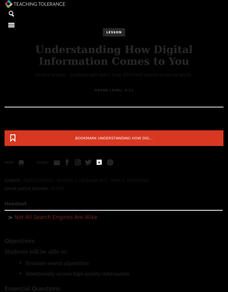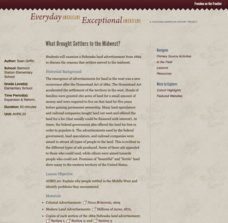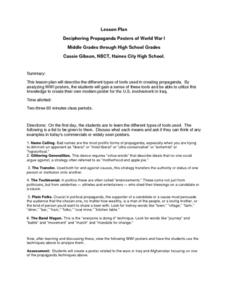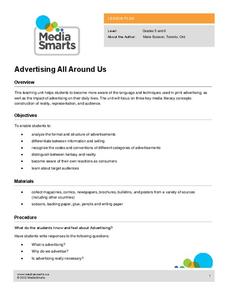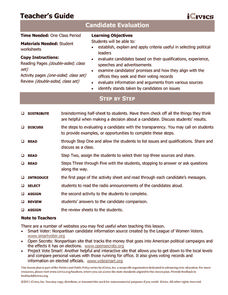Teaching Tolerance
Understanding How Digital Information Comes to You
Google, Yahoo!, Bing ... so many choices, so little time! Using the resource, scholars explore how different search engines affect the way they find information. After reading a handout on the topic and engaging in small group...
Roy Rosenzweig Center for History and New Media
What Brought Settlers to the Midwest?
Drawn by promises of fertile land, thousands of settlers poured West because of the Homestead Act of 1862. By examining images of the ads that drew them westward, learners consider the motivations for movement. They also consider how the...
ReadWriteThink
Critical Media Literacy: Commercial Advertising
Commercial advertising—we can't get away from it, but do we realize just how often we are being advertised to? With this lesson, scholars analyze mass media to identify how its techniques influence our daily lives. Learners browse...
Historical Thinking Matters
Social Security: 3 Day Lesson
What does social security reveal about the political and social culture of the 1930s? After beginning with a brief introductory video on the impact of the Great Depression and how various Americans, such as Huey Long and Francis...
Federal Trade Commission
Ad Targeting and Techniques
What techniques do advertisers use to reach a target audience? Pupils discover the answer with the second of four Admongo lesson plans. Scholars learn about the most common strategies advertisers use to convince people to buy something....
Ohio Literacy Resource Center
Arguing with Aristotle Ethos, Pathos, Logos
Introduce your classes to the Art of Rhetoric with a lesson that focuses on Aristotle's persuasive appeals and how they have been used, both ethically and unethically, to influence opinion.
Curated OER
Deciphering Propaganda Posters of World War I
What strategies are employed when creating propaganda? Your young historians will learn about six different techniques utilized in the construction of political propaganda, particularly in the advertisements of World War I. The...
Visa
Living On Your Own
Learners gain a realistic understanding of what is required for independent living. They begin by setting up a budget based on needs and lifestyle, and then use worksheets and a presentation to practice such skills as reading a...
Media Smarts
Advertising All Around Us
Here is a set of advertising lessons, explore language, techniques, representation, and target audiences. Discuss the impact ads have on our daily lives. What do we see and how do they make us feel? Observe ads from around the...
iCivics
Candidate Evaluation
How can we decide between candidates on election day? After contemplating various issues and qualities, your learners will go through a step-by-step process of researching and evaluating sample candidates and determining their...
Caucus 101
Linkage Institutions: Interest Groups: Option A
How are elections really run and won? Learn about special interest groups, super PACs, and lobbyists with an engaging lesson plan about the caucus process. Young voters research specific interest groups and analyze their part in previous...
Curated OER
Understanding the Influence of the Media
Critically analyze advertising techniques, such as circular reasoning, bandwagon, testimonial, and repetition, with worksheets that effectively discuss and illustrate how the media aims to influence.
Curated OER
Savvy Surfers: Website Evaluation and Media Literacy
Sixth graders strengthen their understanding of what a high quality website is composed of. Learners evaluate three websites for accuracy, credibility, and reliability by completing a chart.
